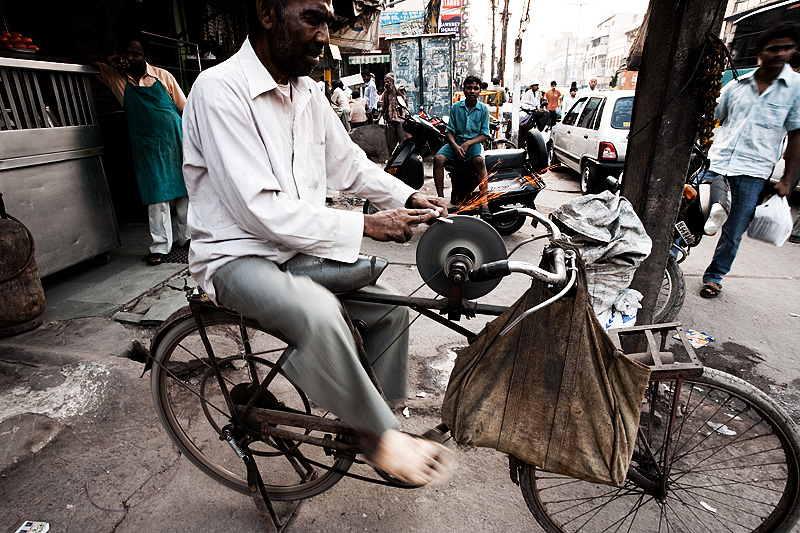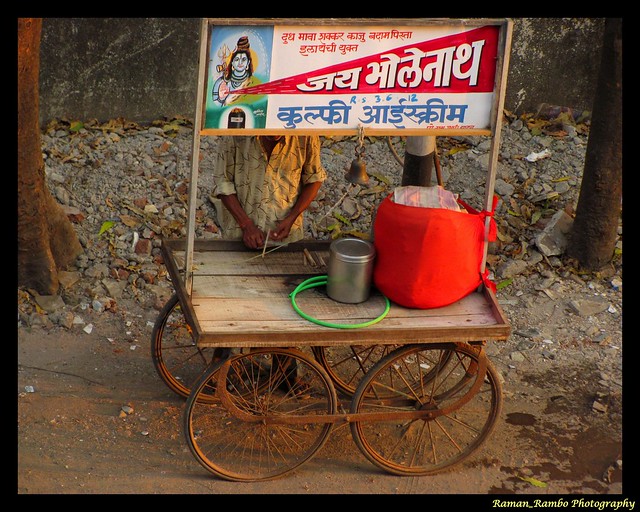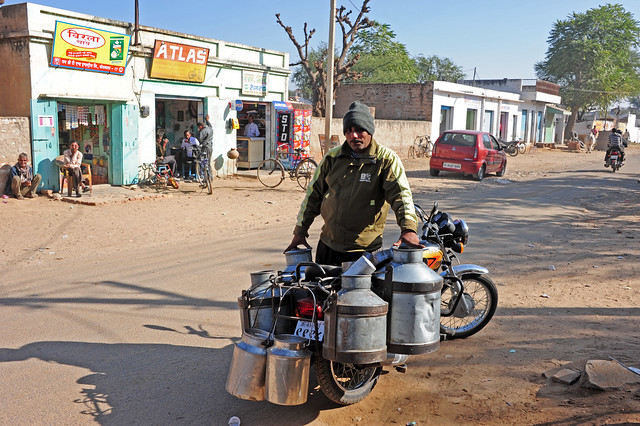People I Grew Up With
"Ma, jamun waala aya hai neeche. 5 rupay do na", mai thoda besabri se bola.
"Maaaaa, jaldi do na, wo chala jayega."
"Aati hu baba", haste hui ma aayi. "Ye le 10 rupay le. 5 rupay ke phalse bhi lete aana..."
When did this happen to you last? Chances are, you have moved to that upscale part of town where the cries of the jamun wallah aren't heard. You can get everything in Ratnadeep now, can't you?
It is human nature to underrate the present and grossly overrate the past. But in today's present, we have traded memories with conveniences, that much is hard to deny. And it seems most will continue to do so in tomorrow's future. What will my children remember of their childhood? Will they be running after kites? Or playing cricket in the Delhi summer's afternoon loo on a harsh, grassless piece of land we euphemstically called a ground?
Maybe, if I try. But there are some people who have disappeared from my life altogether. Some people who gave me many memories, and my children will be poorer for their absence.
The jamunwallah, who would come one evening every week with a wicker basket on his head, whistling a signature tune, that would have us forget our batting chance for a change, throw our bats and run before even hitting the ball!
The knife and scissor sharpener, who would set up shop in front of the garage, a stationary bicycle. A cycle that didn't move despite pedaling, that was a mystery to us. No amount of science taught in school prepared us for that. 'Kaise bhayya, pedal maarne se cycle kyu nahi hil rahi? Aur isse meri kaichi ki dhaar bhi ban gayi?'.
'Kabadi walley-ah (the call had a twang). Paper, botal, kabadi de do-ah'. The call would pierce yet another Sunday morning. Dad would be busy gulping down bread pakore while watching Mahabharat while Mom would be out in the balcony hanging clothes to dry. I would be in some corner of the house, reading a book or waiting for Mahabharat to finish before Captain Vyom would start. Mom would spot the Kabadi wallah and shout out to dad about how the kabaad is piling up in the back balcony. Dad would ignore her. Mom would shout again. I would join in too, recognizing this as the chance to grab hold of the remote. Dad would grudgingly get up, and call out to the kabaadiwallah. He would turn around, park his cycle in the staircase and come up with a set of scales and a jute bag or two. And I would be summoned, to my dismay, to go and get the kabaad, the most menial of the kabaad-tasks. I would much rather watch the weighing, carefully calculate the amount of money we should get, watch dad argue with the guy whose ribs would be showing through his shirt to get Rs 2.5/kilo, instead of Rs. 2.
'Kapde de do. Bartan le lo'. 'Didi, kapde hai purane deno ko? Naye bartan doongi'. The moment I heard this on any day after school, I would know I have half an hour of unsupervised awesomeness. Because ma would be busy with the bartanwalli, busy trading my old jeans, or her old faded saari for a new kharchi, or a bhagona. And I would be, well, not doing what she told me to. "Kapde de do. Bartan le lo'.
'Ting Ting'. This faint sound from the street below worked better than any alarm! The promise of a nice, cold, forzen kulfi on a hot mid-summer day in Delhi would make anyone want to run away from the drudgery that was holiday homework, the mother of all holiday spoilers. How we waited for Birju-kaka. 'Ek safed, aur ek peeli waali dena kaka'. :-)
'Bittu, 6:30 bajne waale hai. Jaldi ja, line bahut lambi ho jayegi!'. 'Uff, saara kaam mai hi karu. Kitni baar bola maine ma, mujhe doodh nahi peena. To kyu lete hai hum log'. 'Bittu, bakwaas band kar aur jaaa, sab batati hu aaj papa ko. Sunday ko cricket dekha TV pe to mujhse bura koi nahi hoga'. That threat would be enough to have me scampering down two storeys, and get in line for the dood-waali lorry that would come everyday at 6:30 in front of the local market. 'Bhayya, 2.5 litre. Paani zyaada milaya hai naa aaj?'.
How I wish my children see this too. They would have other memories. I just hope they would be able to talk of them as fondly as I do about mine.
Just nostalgia, is this? We are constantly & consciously moving away from decentralized, local social setups to centralized, monopolized economic systems. Whether we are moving away or are being moved is a question for another time. But self-employed, self sufficient people who could take pride in not being someone else's slave have been systematically eradicated, their will subjugated and pride broken by a system in the name of development & convenience. And we are poorer for the lack of social relations. Mayur bhayya, our doodhwale bhayya, often fixed my bicycle for me. And it was Birju kaka who taught me why the yellow kulfi is actually yellow, and how that is linked to our tricolour. Good luck developing a relationship with the tiller at Ratnadeep! Of course, you could ask, 'Why do I need to in the first place?' Well, you have already crossed over to the other side, if you do ask that.
'Bittu, Vijay uncle aa rahe hai aunty aur Vishu ke saath. Ja, 5 samose le aa'. 'Maa, 2 rupay waale lau ki 2.5 rupay waale?'
It is human nature to underrate the present and grossly overrate the past. But in today's present, we have traded memories with conveniences, that much is hard to deny. And it seems most will continue to do so in tomorrow's future. What will my children remember of their childhood? Will they be running after kites? Or playing cricket in the Delhi summer's afternoon loo on a harsh, grassless piece of land we euphemstically called a ground?
Maybe, if I try. But there are some people who have disappeared from my life altogether. Some people who gave me many memories, and my children will be poorer for their absence.
The jamunwallah, who would come one evening every week with a wicker basket on his head, whistling a signature tune, that would have us forget our batting chance for a change, throw our bats and run before even hitting the ball!
The knife and scissor sharpener, who would set up shop in front of the garage, a stationary bicycle. A cycle that didn't move despite pedaling, that was a mystery to us. No amount of science taught in school prepared us for that. 'Kaise bhayya, pedal maarne se cycle kyu nahi hil rahi? Aur isse meri kaichi ki dhaar bhi ban gayi?'.
'Kabadi walley-ah (the call had a twang). Paper, botal, kabadi de do-ah'. The call would pierce yet another Sunday morning. Dad would be busy gulping down bread pakore while watching Mahabharat while Mom would be out in the balcony hanging clothes to dry. I would be in some corner of the house, reading a book or waiting for Mahabharat to finish before Captain Vyom would start. Mom would spot the Kabadi wallah and shout out to dad about how the kabaad is piling up in the back balcony. Dad would ignore her. Mom would shout again. I would join in too, recognizing this as the chance to grab hold of the remote. Dad would grudgingly get up, and call out to the kabaadiwallah. He would turn around, park his cycle in the staircase and come up with a set of scales and a jute bag or two. And I would be summoned, to my dismay, to go and get the kabaad, the most menial of the kabaad-tasks. I would much rather watch the weighing, carefully calculate the amount of money we should get, watch dad argue with the guy whose ribs would be showing through his shirt to get Rs 2.5/kilo, instead of Rs. 2.
'Kapde de do. Bartan le lo'. 'Didi, kapde hai purane deno ko? Naye bartan doongi'. The moment I heard this on any day after school, I would know I have half an hour of unsupervised awesomeness. Because ma would be busy with the bartanwalli, busy trading my old jeans, or her old faded saari for a new kharchi, or a bhagona. And I would be, well, not doing what she told me to. "Kapde de do. Bartan le lo'.
'Ting Ting'. This faint sound from the street below worked better than any alarm! The promise of a nice, cold, forzen kulfi on a hot mid-summer day in Delhi would make anyone want to run away from the drudgery that was holiday homework, the mother of all holiday spoilers. How we waited for Birju-kaka. 'Ek safed, aur ek peeli waali dena kaka'. :-)
'Bittu, 6:30 bajne waale hai. Jaldi ja, line bahut lambi ho jayegi!'. 'Uff, saara kaam mai hi karu. Kitni baar bola maine ma, mujhe doodh nahi peena. To kyu lete hai hum log'. 'Bittu, bakwaas band kar aur jaaa, sab batati hu aaj papa ko. Sunday ko cricket dekha TV pe to mujhse bura koi nahi hoga'. That threat would be enough to have me scampering down two storeys, and get in line for the dood-waali lorry that would come everyday at 6:30 in front of the local market. 'Bhayya, 2.5 litre. Paani zyaada milaya hai naa aaj?'.
How I wish my children see this too. They would have other memories. I just hope they would be able to talk of them as fondly as I do about mine.
Just nostalgia, is this? We are constantly & consciously moving away from decentralized, local social setups to centralized, monopolized economic systems. Whether we are moving away or are being moved is a question for another time. But self-employed, self sufficient people who could take pride in not being someone else's slave have been systematically eradicated, their will subjugated and pride broken by a system in the name of development & convenience. And we are poorer for the lack of social relations. Mayur bhayya, our doodhwale bhayya, often fixed my bicycle for me. And it was Birju kaka who taught me why the yellow kulfi is actually yellow, and how that is linked to our tricolour. Good luck developing a relationship with the tiller at Ratnadeep! Of course, you could ask, 'Why do I need to in the first place?' Well, you have already crossed over to the other side, if you do ask that.
'Bittu, Vijay uncle aa rahe hai aunty aur Vishu ke saath. Ja, 5 samose le aa'. 'Maa, 2 rupay waale lau ki 2.5 rupay waale?'







Comments
Post a Comment